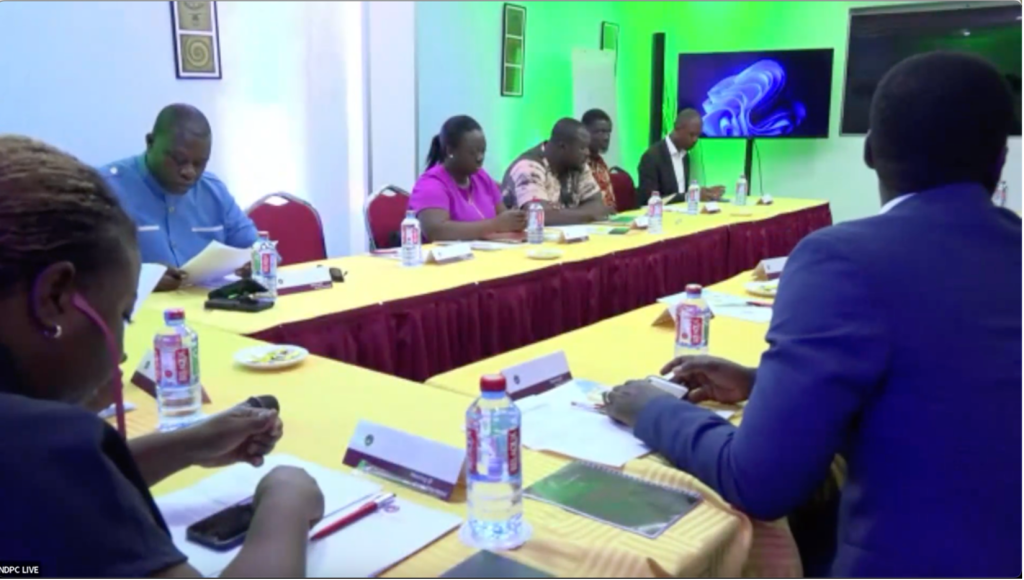Roundtable: Building Resilience into the Transformation of Ghana’s Food System

July 18, 2023
On the 18th of July 2023, the Global Panel, in collaboration with its long-established and valued partners in Ghana, convened a hybrid roundtable to in Accra, Ghana. The event brought together Ghanian experts, academics, and policymakers across the government, representatives from WFP, WHO and AGRA, Global Panel members Emmy Simmons and Tom Arnold, and Professor Patrick Webb (Technical Advisor to the Global Panel) to explore the challenges associated with building resilience in Ghana’s food systems. The term ’resilience’ in this context denoted the capacity of food systems to endure shocks while minimising their adverse effects on functionality, and then swiftly recovering from disruption.
The meeting opened with welcoming remarks from National UNFSS Co-conveners Ms. Paulina Addy (MoFA), and Mrs. Mary Mpereh (National Development Planning Commission in Ghana) and was followed by short interventions from the two Panel members and the Chair of the Roundtable Prof Francis Zotor. Following Professor Patrick Webb’s scene-setting presentation, emphasising the urgency of building resilience into food system transformation, the roundtable focused on two key topics. In the first session, the expert panel, composed of Dr. Joseph Bandanaa (Council for Scientific and Industrial Research (CSIR)), Mrs. Galina Okartei-Akko (agri-business consultant implementing a World Bank resilience project in MoFA) and Mr. Charles Nyaaba (Peasant Farmers Association), provided their perspectives on the evolving short-, medium- and long-term threats to Ghana’s food systems. These included climate change, dependency on imported food and agricultural inputs, loss of nutritious indigenous food products through lack of cultivation, loss of land to commercial activities; tensions between crop and livestock production; land degradation and the threat to soil health; failure to embrace technological changes; challenges in translating policies into actions; and failure to develop the next generation of farmers.

In the second session the expert panel explored the barriers to and opportunities for building resilience into food systems. Discussion focused the need to better support and invest in in-country research and academia, the need for more investment in developing local technological solutions; the deployment of digital forecasting; the use of modelling and better data capture to develop local climate-resistant seeds and crops; working more closely with and supporting farmers; engaging with and empowering women, who comprise 40% of smallholders; exploring the potential of local indigenous crops; marketing as both an opportunity and barrier; working with and learning from external organisations such as the World Bank to focus on building in-country resilience; greater collaboration to ensure coherent policy alignment; the production of nutrient-rich foods rather than simply increasing yields; focusing on double duty actions which would contribute to planetary health and nutrition, and the use of food price controls to promote more nutritious foods.
Both sessions prompted engaged discussions from all participants with members of the Global Panel urging all participants to think as broadly as possible about integrating resilience into their current food transformation pathways, to give greater consideration to innovation, to cut across departmental barriers within government, and between the private and public sector; to consider the additive impacts of the threats identified in the roundtable; to recognise the trade-offs between different policy agendas in a national context; and to focus on both production and demand.
In summing up the event, Emmy Simmonds and Tom Arnold noted how the Roundtable exemplified the importance of capturing local perspectives and knowledge as well as the complexity and challenges of building resilience into food systems to ensure effective implementation of and sustainability of long-term transformation. Chair Prof Francis Zotor emphasised how it had opened the conversation on this vital element of food system transformation and Paulina Addy added that it had provided valuable insights to update Ghana’s national pathways on food systems. The Chair thanked all participants for their contributions.




